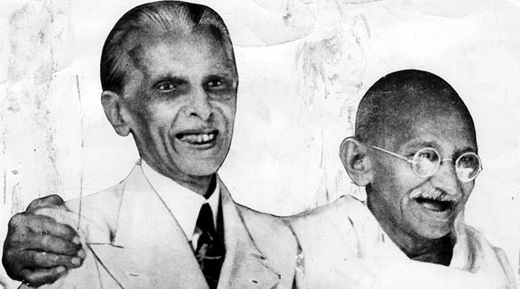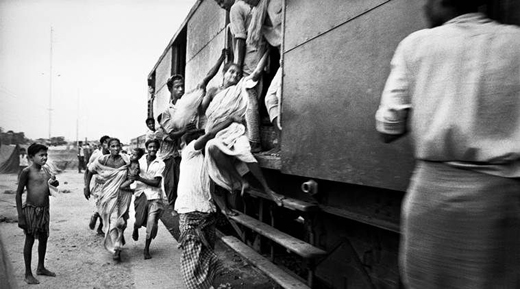Misreading history: Partition did not validate the two-nation theory
Mangalore Today News Network
Delhi, Feb 12, 2020: In February 1943, some months after his Quit India call, prisoner Gandhi went on a 21-day fast in protest against the British empire’s worldwide anti-Quit India propaganda. That month Gandhi discussed the Muslim League’s Pakistan demand with a visitor, Chakravarti Rajagopalachari, the only senior Congress leader not in jail at the time. Having openly disagreed with the Quit India move, Rajagopalachari had not been imprisoned, Yahoo reported.

In their Pune talks, Gandhi and Rajagopalachari quietly agreed under what was later called the C R formula that if the League joined the Congress in a common campaign for independence, the Congress could accept a post-independence plebiscite in contiguous Muslim-majority districts in the north-west and the east of undivided India. If the plebiscite favoured Partition, a bond of alliance would cover the subjects of defence, commerce and communications.
Nineteen months later, in September 1944, a freed Gandhi met Jinnah 14 times in Mumbai to sell him the CR formula. The talks failed. Jinnah offered five grounds for rejecting this formula’s Pakistan. One, it was not large enough: West Bengal and East Punjab were excluded. Two, he said, it was not sovereign enough: The proposed bond of alliance clipped sovereignty. Three, the scheme gave all residents in the contiguous Muslim-majority areas the right to vote on Pakistan, whereas Jinnah wanted the right restricted to Muslims. Four, while Gandhi wanted voting for separation to follow independence, Jinnah wanted the British to divide India before quitting.
Finally, complained Jinnah, while Gandhi was conceding the right of contiguous Muslim-majority areas to separate, he was refusing to admit that Hindus and Muslims were two different nations. “Let us call in a third party or parties to guide or even arbitrate between us,” Gandhi suggested. Jinnah did not agree. Three years later, in August 1947, Jinnah obtained no more than the Pakistan area that Gandhi had offered, but he obtained it without any bond of alliance.
Though a sad Gandhi acquiesced in the 1947 Partition, neither he nor any of the Congress’s prominent leaders such as Jawaharlal Nehru, Sardar Patel, Rajagopalachari, Maulana Azad or Rajendra Prasad agreed that Hindus and Muslims comprised two nations.

What took place in August 1947 was emphatically not the creation of two nations, one Hindu and the other Muslim. It was only the separation of contiguous Muslim-majority areas in the subcontinent’s north-west and east. Later, Pakistan indeed chose to become an Islamic nation, yet India remained a nation for all, with equal rights, firmly entrenched in its Constitution, for all its citizens, irrespective of religion (or race, gender or caste).
Prime Minister Narendra Modi has blamed Partition on Nehru. Assigning sole or main responsibility for that painful event to Nehru lacks any historical basis. It should be recognised, moreover, that if Partition had not occurred, all the residents of today’s Pakistan and Bangladesh would have been free to move to any corner of today’s India.
This should be realised by persons like Union minister G Kishan Reddy of the BJP who claimed, on February 9, that if Indian citizenship was offered, half the population of Bangladesh would migrate to India.
Who should be held responsible for Partition is not this article’s theme. Nor am I focusing here on movements or migrations of people. My purpose is to recall that though the two-nation theory was indeed advanced by the Muslim League after March 1940 and by the Hindu Mahasabha from 1937, India’s 1947 partition did not validate the two-nation theory. It should also be remembered that the Constitution of India adopted at the end of 1949 totally rejected that theory.
Ignorance about one another is a reality in almost every society. So is prejudice about groups different from ours. But the history of human beings is, among other things, a story of growing awareness that all of us are the same underneath.
When a Korean movie wins the Oscar in the US, when people of Asian descent hold powerful political positions in several countries in Europe and North America, when Indian-Americans not only win seats in the US Congress but hope, one day, to send an Indian to the White House, something like the two-nation theory can only be seen as a relic from a retrograde past.
Long ago, people indeed thought that other tribes, races, religious groups or castes were inferior, or superior, or menacing, or an easy target. We know better today.
The two-nation theory has to be rejected not only categorically but also thoroughly. It is not enough to agree that as between Indian citizens no law can discriminate against anyone on religious grounds. Denying a path to citizenship to immigrants of a particular religion is an unconcealed expression of the two-nation theory, apart from being a violation of the constitutional and human principle of equality.
Applied today to immigrants, the theory will be directed tomorrow against fellow-citizens whose ancestors were Indians several hundred years ago. Eventually, it will set neighbour against neighbour. It should be given no sustenance whatsoever, not even in the name of succour for the persecuted.
- Sullia: Rider dies in bike-jeep collision
- Mangaluru: Mustering process held ahead of LS polls
- Mangaluru: BJP accuses Congress of circulating fake pamphlet
- Over 2.88 crore voters in Karnataka to cast their franchise on April 26
- Communally sensitive DK dist was a narrative created by few: Captain Brijesh Chowta
- BJP protests against Congress government’s ‘anti-people’ policies
- Renowned Yakshagana Bhagavatha Subrahmanya Dhareshwar no more
- People must support Congress to develop DK as land of harmony: Padmaraj
- Railways to operate special trains to clear extra rush during election day
- BJP, Congress candidates end campaign by conducting roadshows in Mangaluru
- There is no Modi wave in DK: Harish Kumar
- Railways to operate election special trains from Bengaluru to Mangaluru, Kundapura
- Cops register case against ABVP activists for holding protest without permission
- 6 Dead as massive fire engulfs Patna hotel, over 50 feared trapped, watch
- Horlicks, Boost drop ’Health’ label, rebranded as "Functional, Nutritional drink"
- Not One Vote: Mamata Banerjee’s big message after 26,000 teachers lose jobs
- On complaints against PM Modi, Rahul Gandhi, poll body’s notice to parties
- RBI plans curbs on suspect bank accounts to fight cyber fraud: Report
- Sunita Kejriwal to lead AAP’s Lok Sabha campaign in Delhi, hold roadshows
- ’Desperation born from fear of defeat’: Siddaramaiah slams Modi, defends 4% Muslim quota
- ED challenges Arvind Kejriwal’s plea in Supreme Court: ’173 phones destroyed’
- 103-year-old CSK fan flaunts love for cricket, wishes to meet MS Dhoni
- How an Indian heart saved a Pakistani teen’s life
- Zomato may soon deliver your order faster if you pay more money
- Poll body to establish over 1800 special polling booths in Karnataka
- New residential complex for the judges inaugurated in Mangaluru
- Absconding accused nabbed after 8 years
- Truck with cylinders turns turtle in Beltangady
- Bhoota Kola artist dies of cardiac arrest
- Development of the country should be our goal: Ganesh Karnik
- Container truck gets stuck under Modankap railway bridge
- Truck crushes bike’s pillion rider near BC Road
- Head constable dies of heart attack
- Udupi: PDO dismissed over financial irregularities
- CREDAI to resume Skill Development Program for Construction Workers in Mangaluru
- John B Monteiro elected president of Rachana Catholic Chamber of Commerce & Industry
- Sudhanshu Rai elected district president of All College Student Association
- Chief Minister to visit Mangaluru, Udupi on August 1
- Nitte University awards PhD degree to Tina Sheetal D’Souza
- Sachitha Nandagopal honoured by CMTAI for Community Service
- CITY INFORMATION
- TRAVEL
- TOURIST INFORMATION
- HEALTH CARE
- MISCELLANEOUS




 Write Comment
Write Comment E-Mail To a Friend
E-Mail To a Friend Facebook
Facebook Twitter
Twitter  Print
Print 

